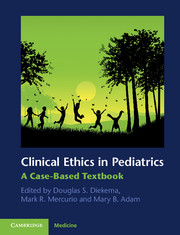Book contents
- Frontmatter
- Contents
- Contributors
- Preface
- Section 1 Core issues in clinical pediatric ethics
- Pediatric decision-making: informed consent, parental permission, and child assent
- 2 Pediatric decision-making: adolescent patients
- 3 Parental refusals of recommended medical interventions
- 4 Adolescent confidentiality
- 5 Refusals of treatment in adolescents and young adults
- 6 Family beliefs and the medical care of children
- 7 Fidelity and truthfulness in the pediatric setting: withholding information from children and adolescents
- 8 Fidelity and truthfulness: disclosure of errors
- 9 Requests for “non-therapeutic” interventions in children: male circumcision
- Section 2 Ethical issues at the beginning of life: perinatology and neonatology
- Section 3 When a child dies: ethical issues at the end of life
- Section 4 Ethical issues posed by advances in medical technology and science
- Section 5 Children, public health, and justice
- Section 6 Special topics in pediatric ethics
- Index
- References
6 - Family beliefs and the medical care of children
from Section 1 - Core issues in clinical pediatric ethics
Published online by Cambridge University Press: 07 October 2011
- Frontmatter
- Contents
- Contributors
- Preface
- Section 1 Core issues in clinical pediatric ethics
- Pediatric decision-making: informed consent, parental permission, and child assent
- 2 Pediatric decision-making: adolescent patients
- 3 Parental refusals of recommended medical interventions
- 4 Adolescent confidentiality
- 5 Refusals of treatment in adolescents and young adults
- 6 Family beliefs and the medical care of children
- 7 Fidelity and truthfulness in the pediatric setting: withholding information from children and adolescents
- 8 Fidelity and truthfulness: disclosure of errors
- 9 Requests for “non-therapeutic” interventions in children: male circumcision
- Section 2 Ethical issues at the beginning of life: perinatology and neonatology
- Section 3 When a child dies: ethical issues at the end of life
- Section 4 Ethical issues posed by advances in medical technology and science
- Section 5 Children, public health, and justice
- Section 6 Special topics in pediatric ethics
- Index
- References
Summary
Case narrative
Richard, a 15-year-old living with his parents and younger sister, has recently been diagnosed with Hodgkin disease after having been brought into the hospital by a school nurse. He enjoyed good health prior to his diagnosis, having previously experienced no major illnesses or need for surgery. After an initial evaluation, Richard and his parents meet with the hematologist/oncologist to discuss the diagnosis and treatment. They are told that with appropriate treatment, including chemotherapy, his chances of long-term survival are better than 90%. However, side effects of treatment are significant, including marked fatigue, nausea, and vomiting. While long-term sequelae may result from the disease and the treatment, Richard could live for decades with the recommended regimen and be able to fulfill his dream of becoming a pilot. His parents ask what the outcome would be if they decline the recommended treatment and are told that his chances of survival would be extremely low, possibly zero.
The parents appear genuinely concerned for their son and seem to understand what is at stake. They thank the physician for the information and then politely say that the decision they have reached is to pray for healing, and not to give permission for their son’s medical treatment. They say that this decision is in keeping with long-held family beliefs and they feel confident that their son is going to be “fine.” Richard, who seems bright if slightly immature, says he agrees with his parents’ decision and that “it’s about respecting family beliefs and tradition.”
- Type
- Chapter
- Information
- Clinical Ethics in PediatricsA Case-Based Textbook, pp. 27 - 31Publisher: Cambridge University PressPrint publication year: 2011

